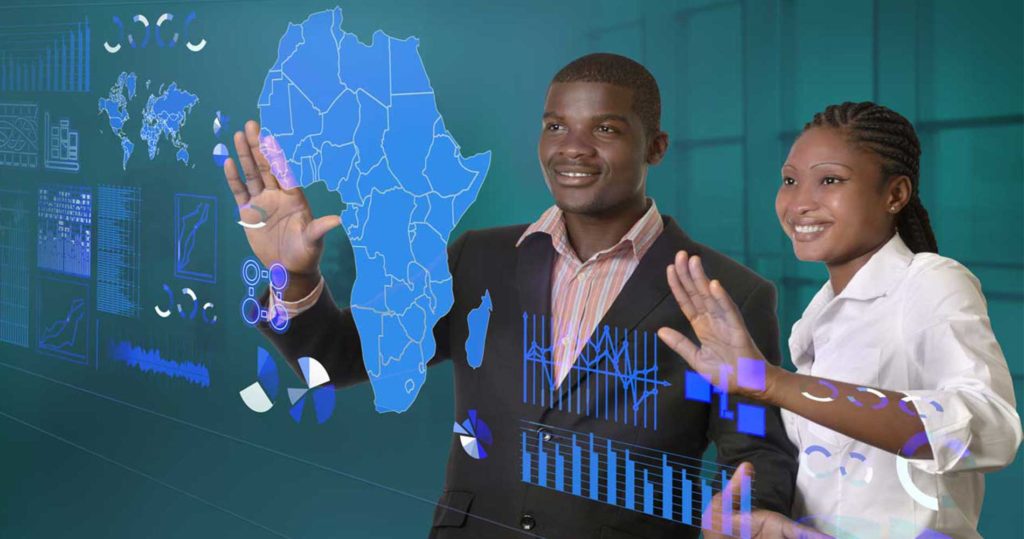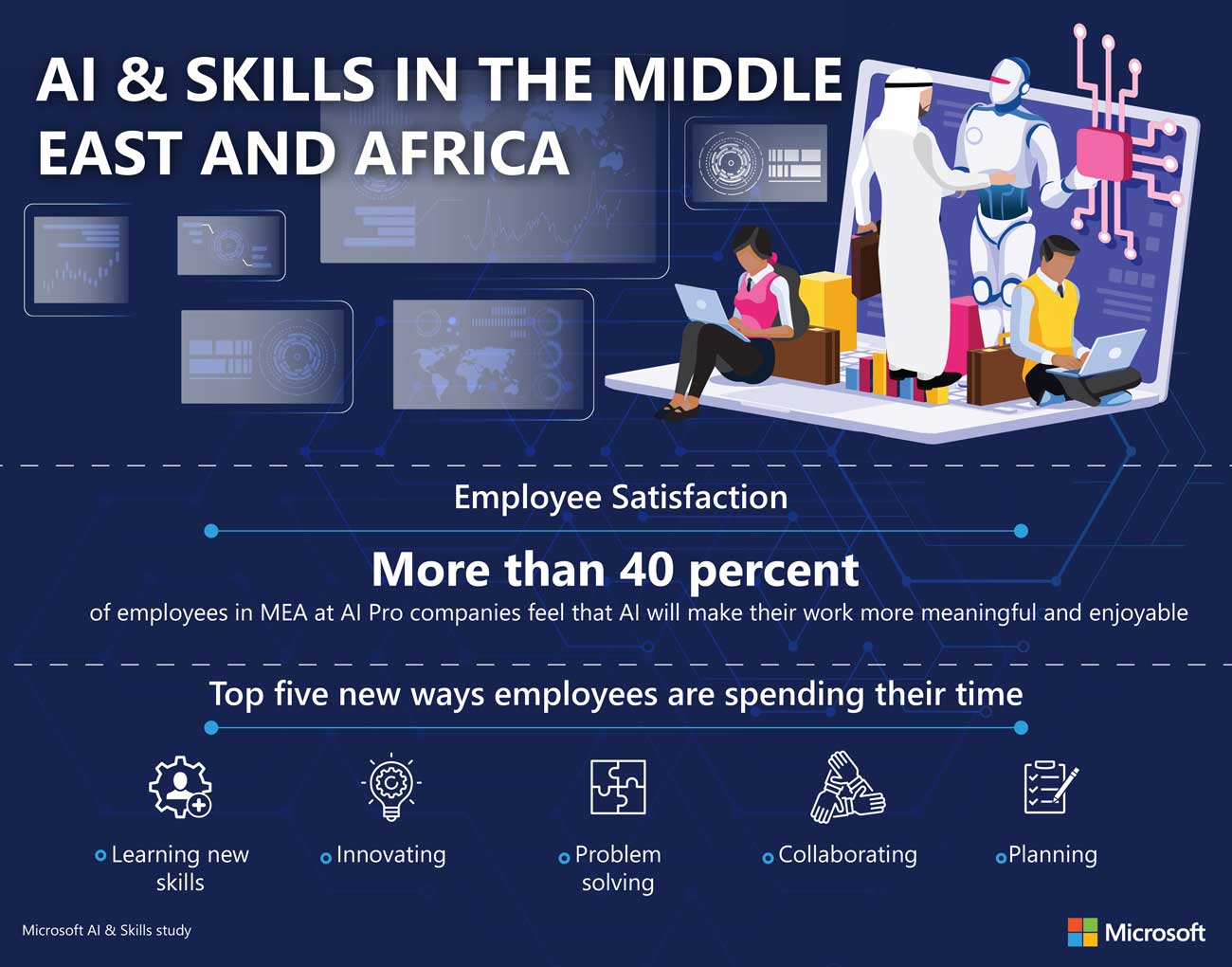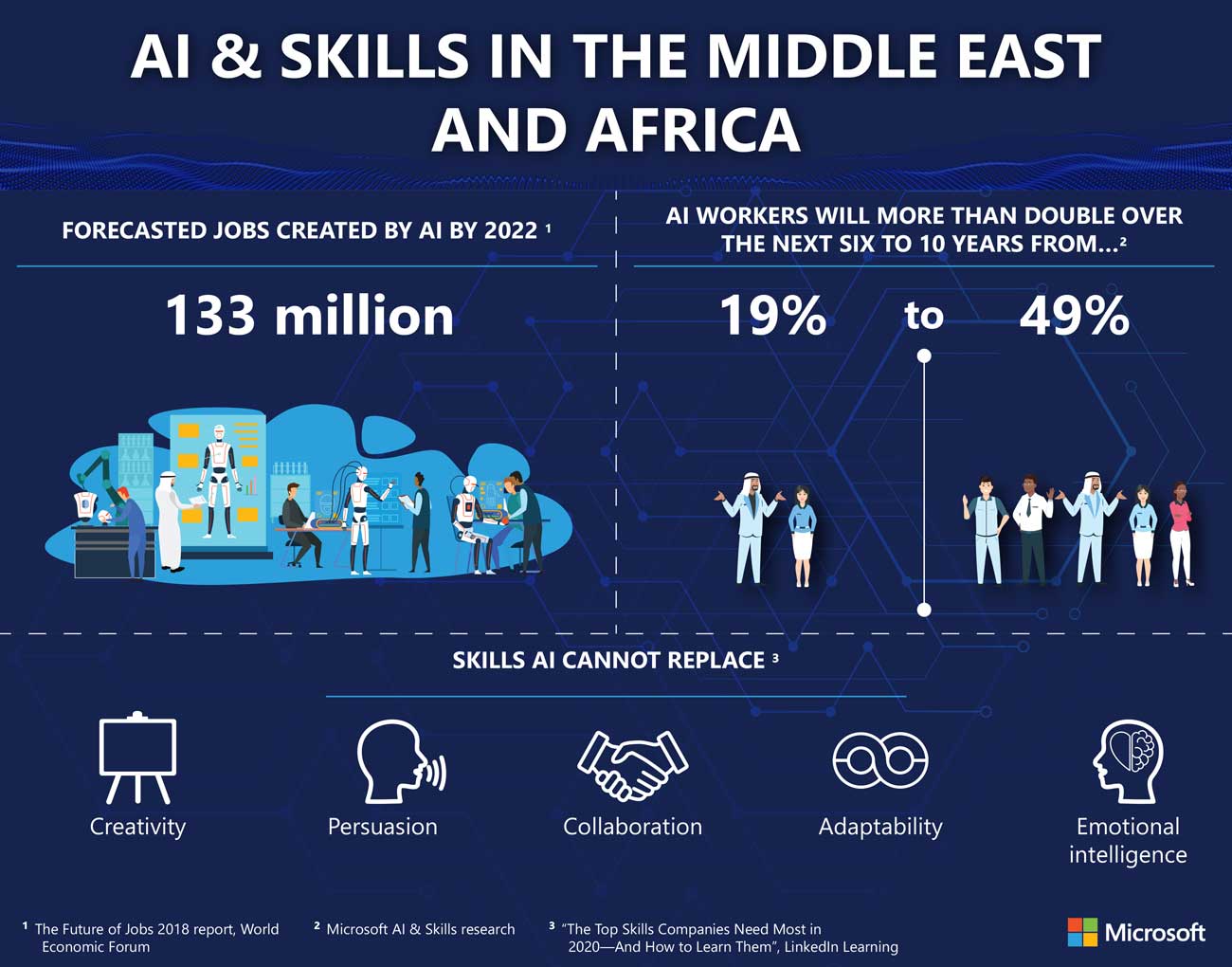
AI is giving employees across the Middle East and Africa time to learn and innovate
Artificial Intelligence (AI) is doing more than just automating processes. Based on Microsoft’s latest AI and skills research, organisations in the Middle East and Africa are already seeing how it is leading to greater skills development, human augmentation and employee satisfaction.
As companies in the Middle East and Africa embrace AI they are starting to see the value it’s bringing to their operations. To see how companies are using the technology, and what lessons can be learned, Microsoft recently surveyed thousands of people around the world, including at companies in Israel, South Africa, Turkey and the United Arab Emirates, to better understand where the region is in its AI journey.
A major benefit of AI is its ability to automate routine tasks and free up time for employees to engage with other challenges. Microsoft’s research found learning was the top new activity that employees spent time on, followed by tasks around invention and problem solving, as well as increased collaboration with customers and colleagues.
More than 40 percent of employees in MEA at companies working a lot with the technology feel that AI will make their work more meaningful and enjoyable. Whether it’s choosing to learn more, innovate, solve a problem or collaborate, employees are finding new ways to contribute to their organisations and communities’ success with the help of AI. The knock-on effect for businesses is increased human capital ‘value’, as well as an increase in employee satisfaction.
The AI landscape in MEA
Globally AI workers – people that have some level of AI augmentation in their jobs – are expected to more than double from 21 percent to 50 percent in the next six to 10 years. But what does the AI skills landscape look like for MEA?
The research categorised companies into three different groups. AI Beginners who hadn’t undertaken a strategy yet, AI Intermediates who were exploring and experimenting, and AI Pros who were formalising and integrating an AI strategy.
Of the companies that are considered AI Pros, the leaders of these organisations said that their investment in AI skills for their employees had increased. Most employees and managers felt that their skills had been greatly augmented.
When it comes to driving skills, AI leaders in the region are actively engaging their employees in building an AI talent base. Nearly 60 percent of companies in South Africa say that reskilling programmes are underway, followed by 51 percent in the UAE, 49 percent in Turkey and 43 percent in Israel.
The majority of MEA companies classed as AI Pros are driving value from AI. This has emerged in the form of new products and services, happier customers, more efficient operations, and additional time for human tasks. The greatest benefit these companies have been able to gain from AI is a more efficient environment for operations. Close behind was the additional time created for more human tasks and new AI-influenced products and services.
Changing the perceptions around AI
Discussions around the use of AI in the workforce can be difficult due to concerns around AI and automation, particularly with the tough economic headwinds the world is currently facing. However, the World Economic Forum’s Future of Jobs 2018 report found that AI may create 133 million new jobs by 2022.
South African social impact business the BroadReach Group is using AI to further enable and empower communities with the launch of the BroadReach Vantage app, which captures data around COVID-19 positive cases and hospital resources. With the help of AI, this information is analysed and then used to trigger contact tracing, as well as predict resource allocation at hospitals.
It’s through this sort of data processing and automation that society will be able to make quick decisions for immediate problems. AI has been successfully applied to assist frontline healthcare workers during a global crisis and the list of applications is set to grow.
AI, however, cannot take the place of human ingenuity. It cannot mimic in-demand soft skills such as creativity, persuasion, collaboration, adaptability or emotional intelligence. In fact, Microsoft’s research found that companies in MEA put leadership and management as one of the top skills they will need in the next five years, along with entrepreneurship and initiative.
The greater problem we face when it comes to AI is the growing skills gap around the globe. While it seems companies in MEA are currently investing in these new skills, it might not be happening at the required pace.
Solving for AI
To successfully implement AI, determining an organisation’s current skills level, as well as present and future needs, is the first step. This will better inform strategy, the selection of the right investments and cultural transformation in the workplace.
With a list of skills, needs, goals and the company-specific value one intends to gain from AI in mind, training will help wide use and adoption.
A good place to start is Microsoft’s host of learning options. Cloud Society is a free online learning platform with a wide range of courses in AI technologies. Microsoft’s AI Business School has six learning paths for specific industries including financial services, healthcare, retail, manufacturing, government and education.
As more companies and employees take steps to understand and use AI, its true value as a technology to augment human capability will shine through. Those who prepare their workforces to be AI pros will create an agile, competitive and adaptable organisation.












![A security team analyses key data from a visual dashboard.]](https://news.microsoft.com/wp-content/uploads/prod/sites/133/2023/04/Security-Sprint_TL_Banner-Image-519x260.jpg)



